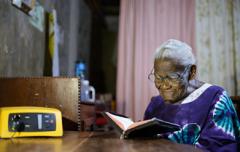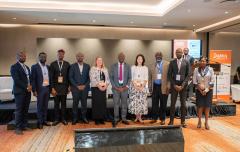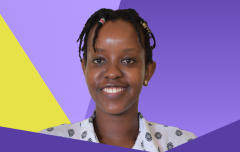Guest Blog: Shining a bright light on the role of digital payments in expanding energy for all
In an age of evolving technology and development, there may be an extraordinary disconnect in addressing the problem of energy access. Consider Vivian who lives in the Western Region of Ghana, about an hour's drive north of Takoradi. She has a farm but most of her income is derived from buying and selling cooking oil. She is able to educate her children, but until recently they were forced to study every night under a kerosene lamp, whose fumes slowly turned her small home’s ceiling beams a shade of black. Luckily for everyone in Vivian’s family, that lamp now sits in a corner unused, as digital payments have enabled Vivian to light her home with clean, modern energy.
Vivian did not have power for many of the same reasons that an estimated 1 billion people still live without electricity. Vivian lives in a rural area, hours from the nearest city. Electricity is a physical good, and extending transmission lines to her house is an expensive, loss-making proposition, particularly in places where capacity is already insufficient to meet existing needs. Unfortunately, in many cases, if a national utility cannot make money serving the customers it has, there is little hope of expanding access. And even if Vivian’s village could connect to the energy grid, the long-distances and low-density of its population would create high barriers to collecting regular electricity payments.
The good news is that all of this is beginning to change for low-income customers like Vivian. She was contacted by a sales agent, representing one of the emerging Pay as You Go (PAYGo) solar companies which finance and distribute solar home systems especially in Africa. The company offered her an opportunity to provide light for her home, providing for days of energy on a pay-as-you-go basis. What’s more, customers benefit from flexible payment terms and a clear opportunity for ownership after 365 days have been purchased. Each day of energy costs a little more than US$0.50, and she can purchase as few or as many days as needed. Since many residents, like Vivian, live too far to make the frequent cash payments, pay-as-you-go solar companies have built their business models to rely on digital payments. By allowing customers to pay from anywhere and at any time, these companies can expand energy access anywhere there is a mobile signal. Without digital payments, the model does not function; Digital payments allow smaller, more frequent repayments that fit the existing spending patterns of lower-income households. In addition, through novel partnerships with payment service providers such as M-Pesa and MTN Mobile Money, this growing sector is expected to finance as many as 15 million new household systems by 2020, bringing light to up to 75 million people.
Reaching energy poor consumers is not without opportunities and challenges: as recently highlighted in a UN Report, of the 1.1 billion people lacking basic access to electricity, 85% of those live in rural areas. What’s more, achieving the Sustainable Development Goal for universal access to modern energy (SDG 7) will mean reducing that number to zero – linking “off the grid” residents with electricity and clean cooking fuels. Connecting these communities and people will require new models and products for energy service, and such models overwhelmingly rely upon digital payments. Utilities can do their part by embracing digital payments combined with pre-paid service to reach lower-income households. We know from countries that have expanded energy access like Kenya and Uganda that the potential is huge. New mini-grid companies have a probable customer base of almost 500 million people, in places where cash collection ranges from costly to unworkable. And pay-as-you-go solar firms can continue to bring solar to households far from any grid, where each payment sent over a small mobile phone can help someone like Vivian to brighten the dark.
The report is published by UN Capital Development Fund (UNCDF) CleanStart and the Better Than Cash Alliance



